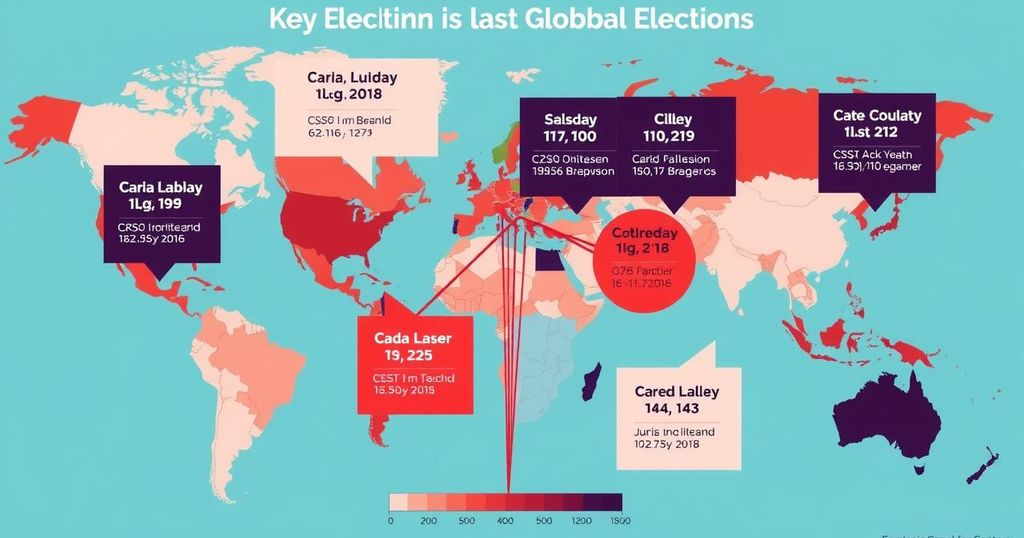Global Elections in 2024: A Year of Political Transformations
In 2024, nearly half of the global population voted in elections that significantly impacted political landscapes worldwide. Notable changes occurred in the United States, India, Europe, Latin America, and South Africa, reflecting growing challenges such as corruption, anti-democratic sentiments, and socioeconomic distress, all of which are poised to shape international relations in the coming years.
In 2024, approximately half of the global population, around 4 billion individuals, participated in elections, marking a record for democratic engagement across the world. Notably, political landscapes shifted considerably in various countries. In South Africa and India, ruling parties faced declining support amid scandals of nepotism and allegations of democratic erosion. Meanwhile, Europe witnessed a marked rise in far-right parties, culminating in governmental instability in France and Germany. In the United States, Donald Trump made a remarkable political return, reshaping the electoral landscape. With significant implications, the electoral results from the past year are poised to influence global geopolitics for years to come.
In the United States, Donald Trump’s victory on November 5 marked a remarkable political revival. Despite his prior controversies surrounding the 2020 election and various legal challenges, Trump earned significant popular and electoral support by focusing on economic discontent and anti-immigration rhetoric. Analysts noted that the results indicated Republicans’ increased appeal among non-college educated voters, particularly men, which could ease the legislative process for Trump’s forthcoming policies. Insiders opine that Trump’s experience now positions him effectively to pursue a more ambitious legislative agenda.
In India, Prime Minister Narendra Modi and the Bharatiya Janata Party suffered notable losses, resulting in the need for a coalition government. This outcome was perceived as a strengthening of democratic processes against Modi’s authoritarian tendencies. Modi’s reduced power may constrain his ability to push through divisive policies. Furthermore, India maintains a delicate foreign policy balance, continuing trade with Russia amidst Western disapproval while also fostering ties with the incoming Trump administration.
In Indonesia, former military general Prabowo Subianto was elected, although under contentious circumstances. His leadership aspirations reflect an image change aimed at gaining foreign investment amidst economic challenges. Prabowo’s administration faces a complex relationship with both China and the United States, which could challenge Trump’s plans to minimize Chinese influence in the region.
The European political landscape underwent significant turmoil, particularly in France, where President Emmanuel Macron called an early election resulting in a split parliament that limited governmental stability. The emergence of far-right parties reflects profound societal divisions, while the caretaker status of both the French and German governments jeopardizes the EU’s strategic focus on security matters, including support for Ukraine.
In the United Kingdom, the Labour Party’s historic victory over 14 years of Conservative governance occurred amid remarkably low voter turnout. However, Prime Minister Keir Starmer’s unpopularity and the economic strains facing the nation’s social services have raised concerns regarding the Labour Party’s direction, given that many of Starmer’s policies mirror those of the previous administration.
In Latin America, Mexico saw Claudia Sheinbaum become the first woman and first Jewish president, continuing the leftist policies of her predecessor, albeit amid concerns of political favoritism within the judicial system. In Venezuela, Nicolás Maduro retained power despite widespread protests and allegations of vote rigging. The socioeconomic repercussions of his regime continue to negatively affect the nation’s stability.
In South Africa, the ruling African National Congress party lost its parliamentary majority, necessitating coalition governance for the first time since the end of apartheid. This shift arises from years of corruption scandals, highlighting the need for reform as the economy grapples with challenges like poverty and unemployment. Nevertheless, advancements such as reduced power outages have been noted post-election.
The 2024 global elections highlighted significant democratic participation, influencing political landscapes across continents. Historically high voter turnout and electoral changes reflect deeper societal concerns, including corruption, authoritarianism, and socioeconomic challenges. As various countries head towards uncertain futures, their new leaders and parties must navigate a rapidly changing global political environment that encompasses rising populism, fluctuating international relations, and the repercussions of prior governance decisions.
In conclusion, the elections across various regions in 2024 signify profound shifts in political power and public sentiment. The defeats of established parties, surging support for far-right ideologies, and transitions towards coalition governance all denote a reshaping of political priorities amidst economic hardships and societal divisions. These developments not only will define the internal dynamics within respective nations but also have far-reaching implications on global geopolitics as leaders grapple with pressing international issues.
Original Source: www.semafor.com




Post Comment